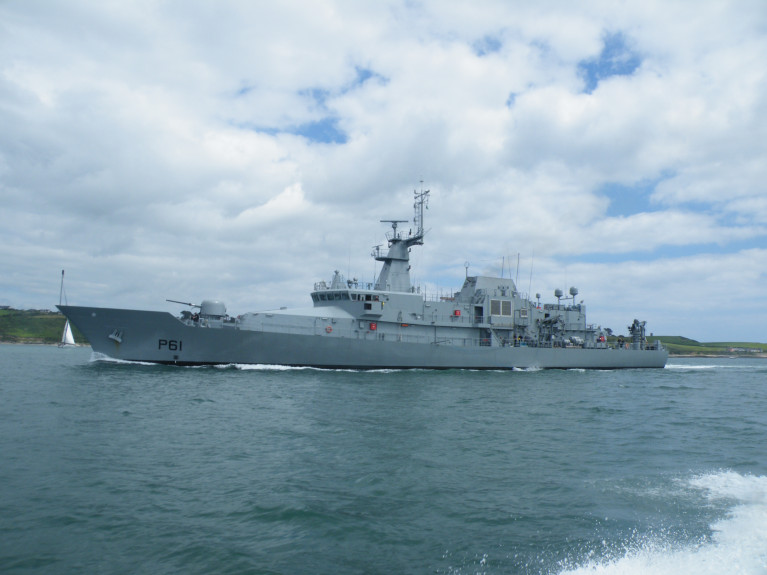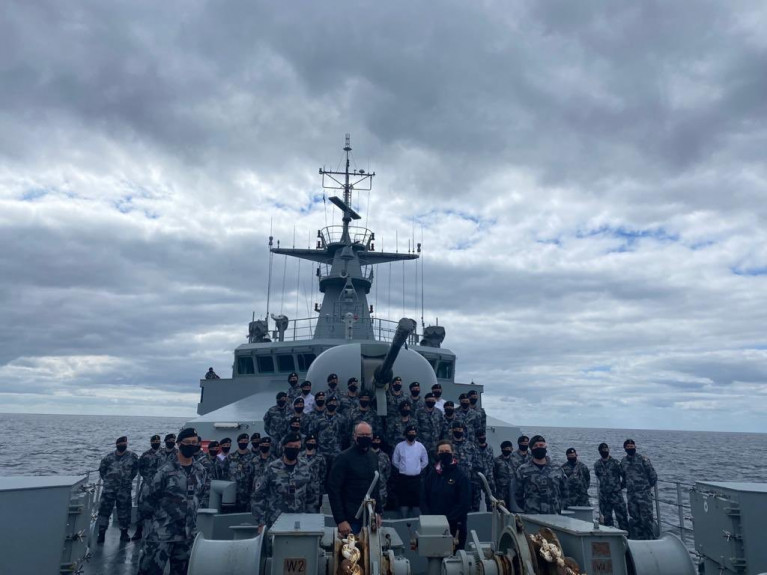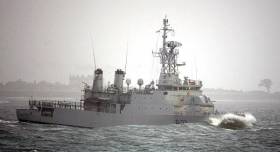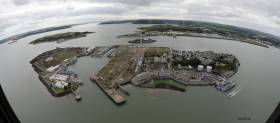Displaying items by tag: Recruitment
Chefs in the Naval Service are at a critically low level and so it has been unable to fill a growing number of vacancies, despite a two-year recruitment campaign aimed at attracting professionals from the private sector.
Currently, the navy has 16 fewer chefs than it requires and this will shortly increase to 18, as two more have signalled their intention to leave the service.
This is putting added pressure on those left to feed sailors and fears have been raised it will become even more difficult to fill these posts because of a countrywide shortage of chefs in the private sector.
Despite the two-year campaign for so-called ‘Direct Entry’ recruitment, the Naval Service has not been able to get one single chef to come into its ranks from the private sector.
Setting up 'field kitchens' can be tricky for soldiers, but the job can sometimes be far more difficult for navy chefs when ships are out on patrols and they have to cook for the crew in gale-force conditions.
Irish Examiner reports on the crew crisis.
Stena Line Launch Recruitment Campaign Across Irish Sea Routes
Stena Line has launched its first national recruitment campaign in a bid to fill up to 60 vacancies onboard its ships across its Irish Sea routes.
This is the first time Stena Line has launched a major recruitment campaign of this nature. The need to be prepared for expanded customer levels post-pandemic is driving the current recruitment process for different roles as part of its crews at sea.
The recruitment campaign entitled ‘A Life Less Ordinary’ is highlighting the benefits of life onboard ferries crossing the Irish Sea and the unique work/life balance on offer with 50% of time spent off*.
January is traditionally the time of the year when people tend to evaluate their career paths.
For more on how to apply can be viewed here.
Minister of Defence Makes Overnight Naval Patrol from Dún Laoghaire In Advance of Recruitment Drive
The Minister for Defence and Foreign Affairs, Simon Coveney T.D has announced support for a Naval Service Recruitment drive.
Minister Coveney, having completed an overnight Naval Patrol from Dún Laoghaire Harbour on board LÉ George Bernard Shaw (P64) to witness first-hand the dedication of the Naval Service and enormous responsibility attached to the maritime service branch of the Defence Forces, has declared his support for the current recruitment drive.
Commencing today, 26th June and for the next week and a half, the Naval Service will launch a tailored recruitment drive targeted at potential inductees to tackle the current shortfall in personnel. As part of this initiative, over (this weekend of 26th-27th June), the Naval Service vessel LÉ Roisín (P51) will be berthed in Dublin Port (at Sir John Rogerson’s Quay), where a pop-up recruitment post will be established.
Mr Coveney said: “This Recruitment Campaign is one of a suite of measures. Other measures that I have introduced include the sea-going service commitment scheme and a tax credit, both specifically targeted for sea-going Naval Service personnel.”
He added “I would like to offer my congratulations to the Naval Service for your part in the Defence Forces receipt, only this week, of a Medal of Excellence from the Maritime Analysis and Operations Centre – Narcotics, MAOC-N, based in Lisbon.
Ireland plays an important role in supporting efforts to disrupt drug trafficking into Europe and I understand as recently as the start of June the Naval Service and other Irish authorities played a key part in a considerable seizure by Spanish authorities.
The Medal of Excellence is therefore a timely and appropriate acknowledgement of the Naval Service’s dedication and achievement, and a reminder of the wide variety of career opportunities available to naval recruits.”
Recruitment in Naval Service Says PDforra Has Reached New Crisis Point
#navy - PDforra, the organisation representing enlisted personnel in the Defence Forces has said recruitment in the Naval Service has reached a new crisis point and the only way to solve it is with pay increases to retain personnel.
As BreakingNews reports, the latest figures obtained by PDforra show there were nearly 800 expressions of interest in the latest recruitment drive for the service.
However, PDforra president Mark Keane said that 50 were initially asked to attend for interviews and medical/fitness tests, but just six turned up to fill a recruit class that is supposed to be 48-strong.
He said on average nearly one-in-five inducted into recruit classes opt out before they are fully trained and more leave quickly afterwards because the pay is so poor.
For further reading on this story, click here.
Calibre of Defence Forces Recruits ‘Reduced’
#NavalService - The Irish Examiner writes of a damning report that highlights the reduced calibre of recruits in the Defence Forces, concluding that some had severe learning difficulties, others were extremely unfit, and one had been arrested numerous times by gardaí.
Some officers within the Defence Forces have queried vetting procedures as the report claims they were unaware of that person’s past until it was pointed out by another recruit.
Garda vetting is not carried out in many cases before recruits are inducted into training. This is because of the need to speed up recruitment to replace the haemmorage of highly trained personnel who are leaving the Defence Forces for better pay and conditions in the private sector.
Garda vetting of recruits can take between three and six months to complete.
For more on the newspaper's story click here.
Howth Yacht Club Seeking To Recruit Club Manager
#Jobs - Howth Yacht Club is seeking to recruit a person for the position of Club Manager, a new position incorporating overall responsibility for the management of the club including administration, marine and hospitality.
Responsibilities for the Club Manager will include management of all facilities and activities, direct management of all staff, contract management and regulatory complacence, financial management and marketing. The Club Manager candidate will report to the General Committee of the HYC.
The ideal candidate will have a proven track record in senior management and have strong interpersonal skills.
The closing date for applications is Friday 18 January. A full job specification and details of how to apply are available at the Howth Yacht Club website HERE.


































































